Related Research Articles
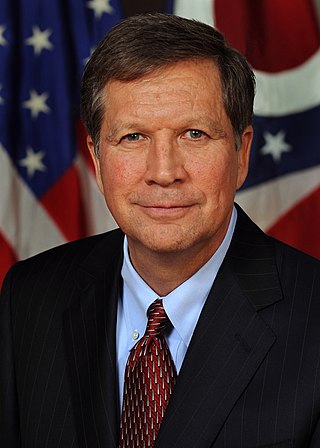
John Richard Kasich Jr. is an American politician and author who was the 69th governor of Ohio from 2011 to 2019, a member of the U.S. House of Representatives from 1983 to 2001, and a Republican candidate for the presidential nomination in 2000 and 2016.
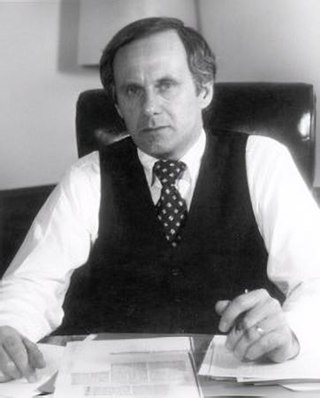
Gordon John Humphrey is an American politician from New Hampshire who served two terms in the U.S. Senate as a Republican from 1979 to 1990, and twice ran for Governor of New Hampshire, though both bids were unsuccessful.
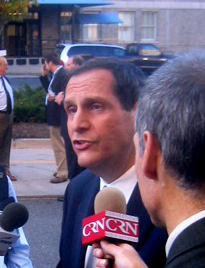
Alan Schlesinger is an American attorney, entrepreneur, and Republican politician. He has previously served as the mayor of Derby, Connecticut from 1994 to 1998 and as a member of the Connecticut House of Representatives from 1981 to 1993. He campaigned unsuccessfully for the Republican nomination in Connecticut's 5th congressional district in 1984, 1990, and 1998.

From January 24 to June 6, 2000, voters of the Republican Party chose its nominee for president in the 2000 United States presidential election. Texas Governor George W. Bush was selected as the nominee through a series of primary elections and caucuses culminating in the 2000 Republican National Convention held from July 31 to August 3, 2000, in Philadelphia, Pennsylvania.
Tony Hwang is an American real estate agent and politician. A Republican, he is a member of the Connecticut State Senate, for the 28th District, which covers parts of Fairfield County. Previously, Hwang as a member of the Connecticut House of Representatives for the 134th District in the Connecticut General Assembly. Hwang became a state representative in 2008 and won re-election in 2010 and 2012. He was elected to the state Senate in 2014 and subsequently reelected. He is the assistant Senate Minority Leader.

This article contains opinion polling by U.S. state for the 2016 Democratic Party presidential primaries. For currency and accuracy, please note the specific dates for each polling as listed below. For the significance of the earliest state votes, the Iowa caucuses and the New Hampshire primary, see United States presidential primary – Iowa and New Hampshire. To know when any given state votes, see the timeline of primaries and caucuses.

Presidential primaries and caucuses of the Republican Party took place within all 50 U.S. states, the District of Columbia, and five U.S. territories between February 1 and June 7, 2016. These elections selected the 2,472 delegates that were sent to the Republican National Convention. Businessman and reality television personality Donald Trump won the Republican nomination for president of the United States.
Twelve presidential debates and nine forums were held between the candidates for the Republican Party's nomination for president in the 2016 United States presidential election, starting on August 6, 2015.
Marco Rubio, then the junior United States senator from Florida, formally announced his 2016 presidential campaign on April 13, 2015, at the Freedom Tower in Downtown Miami. Early polling showed Rubio, who was considered a potential candidate for vice president by Republican presidential nominee Mitt Romney in 2012, as a frontrunner candidate for the Republican nomination for president of the United States in 2016 since at least the end of the 2012 election. Rubio was the second Cuban American to run for president, with Republican Ted Cruz announcing his campaign three weeks earlier. He suspended his campaign on March 15, 2016, after finishing second in Florida's primary.
The 2016 presidential campaign of Chris Christie, the 55th Governor of New Jersey, began on June 30, 2015, at an event in his hometown of Livingston, New Jersey. Following a poor showing in the New Hampshire primary, the campaign was suspended on February 10, 2016. He endorsed Donald Trump on February 26, 2016.
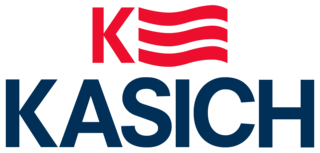
The 2016 presidential campaign of John Kasich, the 69th governor of Ohio, was announced on July 21, 2015. He was a candidate for the 2016 Republican Party presidential nomination. He earned 154 delegates and won only one contest, his home state, Ohio. Kasich suspended his campaign on May 4, 2016, one day after becoming the last major challenger to Donald Trump for the nomination. Kasich vied to become the first Pennsylvania native to hold the office since James Buchanan in 1856, as well as the first from the city of Pittsburgh to do so.

Jack Flanagan is a politician in the United States, and was the majority leader in the New Hampshire House of Representatives.
Newspapers and news media in the United States traditionally endorse candidates for party nomination for President of the United States, prior to endorsing one of the ultimate nominees for president. Below is a list of notable news media endorsements in 2016, by candidate, for each primary race.

The 2016 New Hampshire Republican presidential primary, which took place on February 9, was the second major vote of the cycle. Donald Trump was declared the winner with 35.2% of the popular vote and picked up 11 delegates, while John Kasich emerged from a pack of candidates between 10-20% to capture second place with 15.8% of the vote and picked up four delegates.

On March 3, 2016, U.S. Republican politician Mitt Romney delivered a major speech for the Hinckley Institute of Politics at the Libby Gardner Hall in the University of Utah. In that speech, he denounced Donald Trump, who was then the front-runner in the 2016 Republican Party presidential primaries. He urged citizens to use tactical voting in the remaining primaries and caucuses to maximize the chance of denying Trump a delegate majority.

The 2016 Indiana Republican presidential primary was held on May 3 in the U.S. state of Indiana as one of the Republican Party's primaries ahead of the 2016 presidential election. This was a winner-take-all election, so Donald Trump, who came in first in the popular vote, won all the delegates.

The 2000 presidential campaign of John Kasich, a member of the United States House of Representatives from Ohio's 12th District who eventually became the Governor of Ohio 10 years later, was officially launched on February 15, 1999, when he announced the formation of an exploratory committee. Had he won, Kasich would have been the first president since James A. Garfield to be elected from the House of Representatives, as well as the first Pennsylvania native since James Buchanan to hold the office.
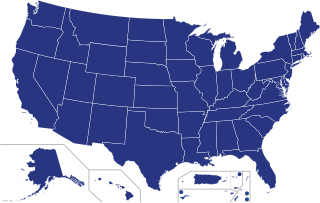
Presidential primaries and caucuses of the Republican Party took place in many U.S. states, the District of Columbia, and five U.S. territories from February 3 to August 11, 2020, to elect most of the 2,550 delegates to send to the Republican National Convention. Delegates to the national convention in other states were elected by the respective state party organizations. The delegates to the national convention voted on the first ballot to select Donald Trump as the Republican Party's nominee for president of the United States in the 2020 election, and selected Mike Pence as the vice-presidential nominee.

The 2016 Massachusetts Republican presidential primary was held on Tuesday March 1, as one of the Republican Party's 2016 presidential primaries. Massachusetts was one of eleven states that held both their Democratic and Republican presidential primaries on that day, dubbed "Super Tuesday". 42 delegates were allocated proportionally to all candidates who received at least 5 percent of the vote in the primary.
References
- 1 2 Blair, Russell (2016-01-21). "Former Connecticut GOP Operative Endorses Kasich For President". Hartford Courant. Retrieved 2017-11-08.
- 1 2 "Yankee Institute: Yankee Institute Is a Small Office With a Big Influence". tribunedigital-thecourant. Retrieved 2017-11-08.
- 1 2 "Fergus Cullen Bio". ferguscullen.com. Retrieved 2017-11-08.
- ↑ "Heading Into New Hampshire, GOP 'Front-Runners' Are Anything But". NPR. 2016-02-04. Retrieved 2017-11-08.
- ↑ ThemeFuse. "Leadership". www.americans-by-choice.org. Retrieved 2017-11-08.
- ↑ Killough, Ashley (2016-01-21). "John Kasich key New Hampshire endorsement: Fergus Cullen". CNN. Retrieved 2017-11-08.
- ↑ "Fergus Cullen - Republican Distance Runner". New Hampshire Magazine. 2010-03-01. Retrieved 2017-11-08.